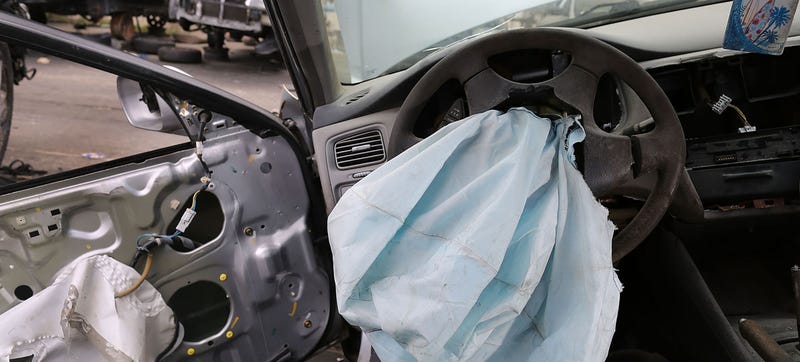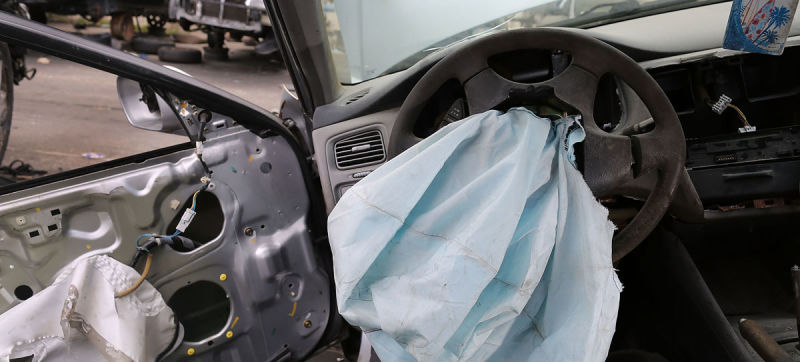
The Japanese Ministry of Transport is partnering with automakers to send workers to visit the homes of car owners who have not yet had their potentially lethal Takata airbags fixed. That might seem strange to outsiders, but in Japan, this kind of house call is the norm.
http://jalopnik.com/your-guide-to-…
In addition to government officials and representatives of the various car companies visiting homes and giving surveys about customers’ “attitudes” (because house visits and surveys just seem to go hand in hand), the ministry is also using a direct mail campaign to reach vehicle owners, reports Bloomberg.
Advertisement
The government will start the direct mail campaign this month, Nobuhito Kiuchi, an official in the transport ministry, said by telephone Friday. It has also started visiting the homes of some of the owners with representatives of automakers to conduct an attitude survey, he said. The ministry first said it will initiate these measures in a statement dated April 28 on its website.
While even the writing campaign might seem unusually proactive, home visits might seem particularly unusual to Westerners.
However, both in government and in business, many issues are addressed by visits to the home. Given that with each passing day more reports show the deadly potentiality for any unserviced vehicle on the Takata recall list, you could even say this issue makes more sense than most do here. In Japan nearly 13 million vehicles have been recalled since 2009 with barely more than half of those repaired.
Sponsored
But if you think just major crises prompt house calls in Japan, well, you would be wrong.
Here in the land of the rising sun, I have regularly encountered the case of representatives of businesses appearing at my apartment should a payment not be made or a strange situation have occurred. And members of various government agencies showing up is actually pretty normal. I’ve dealt with census takers very recently, but they were regular municipal employees. Not the kind of temporary workers you might see in other countries, but just people who work downtown in the city office.
NHK, the public broadcaster, dispatches agents that go around in person attempting to collect the associated public broadcasting fees. Many people try to avoid them for various reasons, and some of them can be absolutely ruthless, but when you understand the agents effectively work on commission, you can understand their motivation in getting you to pony up.
Think the PBS Telethon… only year-round, even more aggressive, and knocking on your door like literal “televangelists.” You know, evangelizing for TV.
Advertisement
And that’s just the government—businesses do it too. My gas company hand delivers my gas bill each month (or drops it in my box, if I am not present), and I’m always given an opportunity to offer feedback to the person making the delivery.
When I made it clear to the representative one of the payment options wasn’t working out for me, and I asked for a different payment option, they made it happen. This was even though my preferred payment option was usually only for businesses and not for private residences.
Even the police make friendly house calls, whether you’re making a report or not. My first and most recent interactions with Japanese police have been friendly visits. The first time I encountered a Japanese police officer, I had been very sick and went home from work. My work called my koban (交番) or police box (sadly, none of them feature time-traveling immortals), and a police officer showed up at my door with soup and medicine.
Just recently I had some laundry stolen out of my backyard, and not one, not two, but three Japanese police offers immediately responded and took the report and were positively cheerful the entire time. Worth remembering that in Japan, the image of the “omawari-san,” or the local beat cop, is generally pretty happy-go-lucky, and literally means “wandering around patrolling person.”
So in a country where you expect that the government and even major businesses will be knocking on your door (but sadly, not bringing any potato salad or casseroles) anyway, it’s not at all unusual given the very grim effects of faulty Takata airbags that home visits might be used. Not only does it immediately and in person remind car owners of the danger, but it also underscores a fundamental part of Japanese society.
In Japan, we are supposed to always consider the good of everyone, and as good “citizens,” the car companies and the government want to be seen practicing what they preach.













